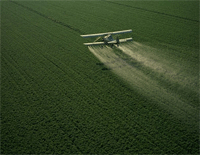Difference Between Herbicide and Insecticide

What do you use when you want to get rid of those broadleaf weeds, or pesky fire ants? All farmers, and most avid gardeners, use herbicides and insecticides, and there are certainly differences in the intended use of these products. This article is going to point out the differences and the purposes of both of these products.
Intended Use
Herbicides were developed to kill plants. People use different herbicides to kill weeds in their yards and flower beds, but they are also used to eradicate plants growing along railroad embankments and industrial sites. Herbicides have also been developed to only be effective on the intended types of plants.
Insecticides were developed to kill insects. Farmers use various insecticides to exterminate insects that are detrimental to plant growth. Various types of insecticides are used to target the eggs or larvae of the insect, and several varieties eradicate the adult insects. Homeowners use insecticides to destroy termites, ants, roaches, and other pests that invade the house and its surrounding yard.
Original Use
Tactical herbicides, such as salt, have been used for thousands of years, dating back to the Romans at around 150BC. Salting the ground prevented agricultural crops from growing, and continued to be used until the 1940’s, when scientists discovered successful methods to differentiate one plant from another, and eliminate undesirable growth.
Botanical extracts, such as nicotine, rotenone, or pyrethrum, were used for hundreds of years to control the insect destruction of crops. These are continued to be used around the world, but modern chemical compounds are more widely utilized.
Types
There are different types of herbicides that target specific plant types. These include the following:
· Broad-spectrum herbicides that kill all types of plants; generally used for landscaping needs, utility right-of-ways, and roadsides.
· Tactical herbicides. which are used in an aerial spraying system to efficiently kill a wide variety of foliage.
· Selective herbicides, which are targeted at specific types of plants and weeds, such as broadleaf weeds or grasses.
There are a variety of insecticides used for different functions. These include:
· Systemic insecticides are placed on the plants on which the insects feed.
· Contact insecticides are sprayed directly on the insect.
· Natural insecticides, such as nicotine, neem, and pyrethrum extracts, are physically toxic to the insects; however, several of these are banned because of contamination to foods.
· Organic insecticides are created with chemicals and other compounds.
· Inorganic insecticides are made with metals and some type of arsenate, such as sulfur or arsenic; however, some of these are banned as well.
Advantages and Disadvantages
Some of the advantages of herbicides include the ease of use, speed of destruction, safety, and cost. Some of the disadvantages include toxicity to animals and humans, and damage to the environment.
Some of the advantages of insecticides include the production of higher crop yields, because destructive insects are reduced, and the population of good insects is controlled. Disadvantages are demonstrated when overindulgent uses of the toxins ruin the soil and adversely affect useful micro-organisms, as well as when they enter the food supply, and affect humans and animals.
Summary:
1. Herbicides are used to kill weeds in yards and flower beds, but insecticides are used to kill insects and worms that infect plants.
2. Insecticides can also be used to kill small pests, like termites and ants, which invade the house, while herbicides are essentially used to destroy weeds.
- Difference Between Schizophrenia and Psychosis - March 7, 2024
- Difference Between African and Asian Elephants - March 7, 2024
- Difference Between Sunscreen and Sunblock - February 15, 2024
